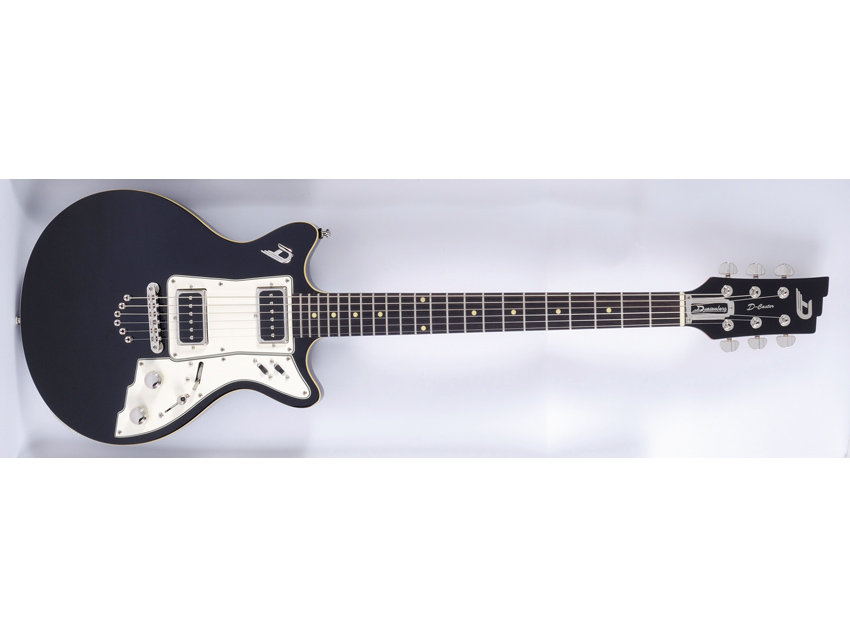MusicRadar Verdict
A cool six-stringer with plenty of personality… but are you cool enough to play it?
Pros
- +
A quirky, fun and individual guitar with a solid, versatile set of sounds.
Cons
- -
The neck join should be much neater.
MusicRadar's got your back
Retro designs have become an important part of the guitar and bass market. In many cases they are aimed at the lower end, but Duesenberg does things a little differently. Our first impression of the Duesenberg D-Caster is that it's a very cute looking instrument indeed.
The compact double-cutaway body is svelte thanks to nicely chamfered rear edges and a light arch on its bound top. A set maple neck joins the mahogany body at the 16th fret, and while it's not the neatest, tightest join in the world (and there's a slight lip where the upper treble side of the fingerboard meets the body) upper fret access is very good.
In addition, the less-than-perfect neck fitting hasn't adversely impacted the guitar's natural sustain and resonance - the D-Caster has a sprangy, lively acoustic voice with plenty of sustain that promises good amplified performance.
The maple neck itself is finished in satin with an amber tint that ties in with the instrument's retro stylings. A scarf joint that begins at the first and ends at the fourth fret means that while two pieces of maple form the basis of the neck, there are no ugly joins on the back or sides of the back-angled three-a-side headstock.
Perhaps the most obvious quirk amidst the D-Caster's spec is the wiring configuration. In addition to a standard three-way blade pickup selector and volume and speed tone pots, a pair of Jaguar-style slide switches govern a 'swell pot'.
This is essentially a spring lever that controls a potentiometer that can be assigned via the slider switches to control either a volume swell effect, or a 'tone effect' - essentially a wah-like tone filter.
You can also turn it off completely in songs where it isn't required, or if you're concerned about accidentally disturbing the lever while playing.
Want all the hottest music and gear news, reviews, deals, features and more, direct to your inbox? Sign up here.
True grit!
As ever with Duesenberg you are buying into an aesthetic as much as anything else, and from the chrome 'D' logos to the plenty of sparkle and spank available, there's no shortage of grit on tap either.
While not our first choice for extreme gain, there's more than enough power from these pickups to flip to our test valve head's drive channel and throw down some classic rock lead licks and more modern alt-rock riffs.
Backing off the gain, we realise for the umpteenth time why P-90 style single-coils are perhaps the best all-rounders in the pickup spectrum.
Snappy country bends, mellow jazz, brash indie chime - all your clean needs can be met with a flick of the three-way pickup selector and a touch of amplifier EQ adjustment.
If this set of sounds was all that the D-Caster had to offer, we'd be happy enough, but the swell pot promises additional flexibility. With the volume setting selected, it's clear that the small sweep means you can't achieve the same kind of subtle swells that you can with the volume pot or a volume pedal.
What you can do rather effectively though, is simulate a kill-switch or staccato tremolo effect, and the lever feels robust enough to take some pretty heavy abuse in this respect.
Flip to the tone effect mode and, again, the sweep isn't broad. Think subtle tonal shifts for emphasis rather than full-on chk-a-chk-a percussive wah effects.
While both tone and volume functions are more mildly diverting than must-have features, they are certainly fun, and their presence in the circuit doesn't seem to have any sonically detrimental consequences.
Chris Vinnicombe worked with us here on the MusicRadar team from the site's initial launch way back in 2007, and also contributed to Guitarist magazine as Features Editor until 2014, as well as Total Guitar magazine, amongst others. These days he can be found at Gibson Guitars, where he is editor-in-chief.
